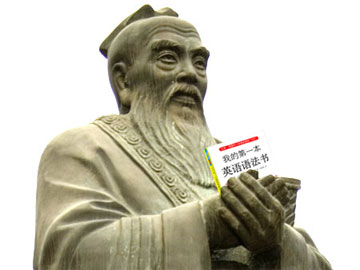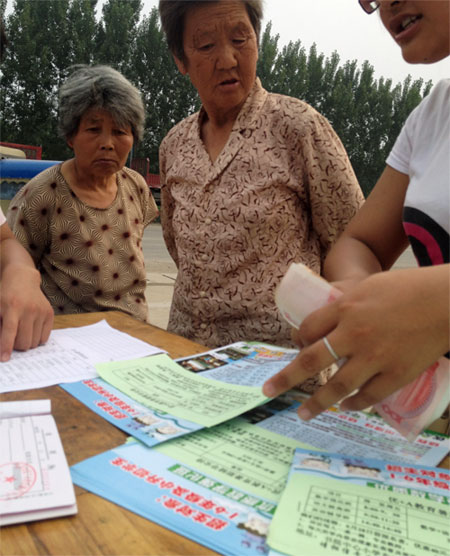The Sage and the Sales Pitch
White-fronting in Confucius’s hometown – by Brent Crane

I have a Swiss friend who says yes to everything. When anyone asks him if he wants to do something – grab a bite to eat, go jump in a creek – he almost always agrees. “Why not?” he says.
I thought of him when I agreed to a money making opportunity recently. I was visiting Qufu, a city in Shandong province known throughout China as the birthplace of Confucius, and nothing else. It is a poor and gritty third-tier city, where air pollution has stained the sky permanently grey and residents drive shabby motorbikes and half-constructed tuk-tuks through dusty streets. Without its connection to ancient Chinese history, it would be nothing more then a grey blot among grey blots.
From Beijing, it took me two hours by high-speed train to get to Qufu. Until the outskirts, where the landscape gets mountainous, the view from the train window is painfully predictable. Miles of flat farmland are interrupted by drab, hastily constructed cities and grey condominium parks. Even the farmland has a feeling of artificiality, with its square plots of land and pencil-straight irrigation canals. Wilderness is an unfulfilled promise here. The peasants working the fields looked pitifully small against this never-ending backdrop, like tiny figurines being moved by invisible puppeteers.
I had come to Qufu to meet up with Matty, an old friend from high school who has spent the last nine months teaching English at Qufu Normal University. It was the day of his class’ final English exam, and he had nothing to do until 7pm. We were sipping coffee at the campus café when he got a WeChat message from a friend of a friend. She worked for a “training school” and wanted a laowai to help advertise the school that afternoon. “Do you want to do it?” Matty asked me. “They’ll pay you 100 RMB.”
I thought about it for a second. “Why not?”
Three hours later, I was in the back of a three-wheeled motor cart driven by a boy called Smiley. Sitting with me were Kate and Abby, two college-aged employees at the Excellent A Training School. We drove past the ancient walls of Qufu’s old town and out into the surrounding countryside, where rows of corn – locals call them “sticks” – are everywhere. Kate and Abby chattered happily as our cart buzzed along a cement road through the farmland, past piles of freshly-pulled crop surrounded by dirt-stained farmers. They teased Smiley whenever he went too fast over a speed bump.
After a half hour, we arrived at an elementary school. There were a couple of old tables and stools stacked against a wall. Smiley threw them silently in the back of his cart and drove a few yards to where parents and grandparents were waiting for school to end, standing patiently by their battered motorbikes. A red banner hung along the school gate read: Delve deeply into developing “educational safety”.
Most of those there were grandparents, as the parents were all farmers and would work the fields until mid-evening. We lifted the tables and stools out of the cart and set them up outside, near the waiting grannies and granddads. Abby and Kate pulled out a pile of flyers, a sign-up sheet and pen. Literally within seconds, we were surrounded by them, over a dozen chirping old peasants, all eager to hear my new colleagues’ sales-pitch. They swarmed to us like sharks to a freshly speared fish.

Abby and Kate handled them with ease, handing out fliers and explaining the benefits of the training school. Some of them listened intently, others just hung around grinning, entertained by the commotion. Within four minutes, there were already six names and phone numbers on the sign-up sheet. The whole while, I sat silently on a stool next to them, jotting down notes in my notepad. “What are you writing?” a grandma stammered at me. “It’s my personal diary,” I said. That satisfied her, and she turned back to the rumpus.
Training schools are highly popular in China and the competition between them is high. In Qufu alone there are over two hundred, Kate estimated. There’s a training school for nearly everything, including science, maths, music and writing. This one promised to improve students’ English grades – hence that suspicious “A” in the school’s name. For a few hours a day, at 380 RMB for 30 days, the students would receive English lessons and lunch. The Excellent A Training School was targeting farmers because most of them hadn’t received a good enough education to help their children with homework.
One college student in Qufu I spoke with, whose English name is Peter Philadelphia and who works at another English training school during the summer, was critical of the schools. He said that they focus too much on boosting grades and not enough on improving a student’s learning abilities. “I wanted to bring out their learning, but they only wanted me to do their homework for them,” Peter lamented. In the birthplace of Confucius, who taught unquestioning loyalty to one’s superiors and stressed the importance of test taking, this seemed a pretty standard problem.
Kate is manager of the Excellent A Training School, which was started three years ago by a 24 year old graduate of Qufu Xingtan College. They employ three teachers, all of them college students as it is illegal to employ officially registered teachers at a training school. They’re cheaper anyway, Kate said – for one month of teaching they are paid 2000 RMB (around $300). One of the photos on their flyer was of a white guy teaching a classroom, and was captioned “Our foreign teacher”. The other photo was of a crowd of children and simply read “Watermelon competition”.
Suddenly, the gates opened and a crowd of boys came sprinting out of the school like race horses. Some ran over to our table to see what was going on, but most just hopped on the back of their grandparent’s motorbikes or scooters and sped off. The school was next to a busy road where bikes zipped alongside giant trucks carrying sand, gravel, wood and other construction materials. When the kids rushed out, the whole street erupted in a cacophony of car horns. “Why are they honking?” I asked, and pointed at the trucks. “So the kids know not to run into the street,” Kate answered matter-of-factly.
Before long the honking died down, and the students were all carried away in relative safety. By the end of the session, the Excellent A Training School had collected twelve names and phone numbers. Three of the new sign-ups had made 100 RMB deposits to reserve a spot in the upcoming classes. I hadn’t said more than five words. “Why did you bring me here?” I asked Kate. “So the parents will more believe us that it is in a more official education,” she answered in English. My white face had added legitimacy to their business. I had been paid 100 yuan to sit and smile.
•
Brent Crane is a freelance journalist based in Beijing. He likes to write about Asia, and has done so for publications including Diplomat, American Interest and World Affairs Journal. You can follow him on Twitter @bcamcrane

















